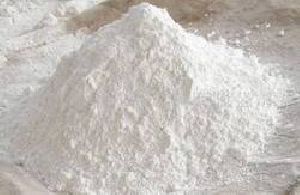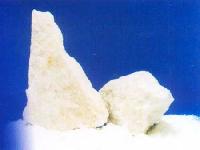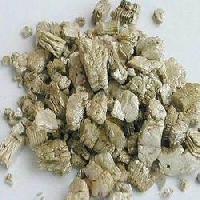
Silica Powder
2 Per Kilogram
1 Ton (MOQ)

Bartyes Powder
Get Price Quote
Barite is a mineral that is used in radiology and in industries to drill. We have been supplying Bartyes Powder for quite some time now and have earned ourselves an excellent name in the market. We are wholesale merchants and manufacture and supply this in bulk and marginal quantities only. Our rates are also fairly reasonable considering the quality that we provide without fail each time.
Best Deals from Industrial Mineral

Tile And Stone Adhesive Powder
880 Per 40 Kilogram

Soapstone Powder
Get Price Quote

Calcined kaolin powder
Get Price Quote
10 Metric Ton (MOQ)
Calcinated Kaolin for Paints, Coating & Pigments are heat processed into high-quality calcined pigments. These are used as pigment extender for Paints, polymers and plastics. The manufacturing process is designed for close control of the formation of the finished porous aggregate structure, leading to increased performance at reduced cost and improving the performance of paints, plastic, paper and rubber. It is a high brightness clay, with exceptional light scattering properties which give rise to the product’s excellent opacifying properties, making it an ideal TiO2 extender (can replace 20% TiO2) in many industrial applications.

Silica Powder
Get Price Quote
We are a leading manufacturer, exporter and supplier of Silica Powder based in Alwar, Rajasthan, India. Silica is considered to be one of the most common minerals of Earth, which is also the component of sand, quartz and other minerals. The product is extracted in natural form by mining and grinding into fine powders or granules. Also, synthetic silica is prepared from the silica sand. In line with diverse demands across the globe, we make it available in different packaging sizes. The product is available at affordable range of prices.

Marble Powder
Get Price Quote
Our team members assist us in settling down the payment procedures and they help us in making transactions that are completely secured and are executed as per the client's convenience. Carrying out systematic quality process at every stage, we keep our quality standards high to gain customers' satisfaction.

16-32 Marble Powder
Get Price Quote
25 Ton (MOQ)

Pyrophyllite Powder
Get Price Quote
Clients can avail excellent quality Pyrophyllite Powder from us. Pyrophyllite is a phyllosilicate mineral species belonging to the clay family and composed of aluminum silicate hydroxide : AlSi2O5OH. Pyrophyllite Powder occur in two more or less distinct varieties, namely, as crystalline folia and as compact masses; distinct crystals are not known. The folia have a pronounced pearly luster, owing to the presence of a perfect cleavage parallel to their surfaces : they are flexible but not elastic, and are usually arranged radially in fan-like or spherical groups. This variety, when heated before the blowpipe, exfoliates and swells up to many times its original volume, hence the name pyrophyllite, from the Greek pyros (fire) and phyllos (a leaf), given by R. Hermann in 1829. The color of both varieties is white, pale green, greyish or yellowish; they are very soft (hardness of 1 to 1.5) and are greasy to the touch. The specific gravity is 2.65 - 2.85. The two varieties are thus very similar to talc. The compact varieties of Pyrophyllite Powder are used for slate pencils and tailors chalk (French chalk) and carved by the Chinese into different kinds of small images and ornaments. Other soft compact minerals (steatite and pinite) used for these Chinese carvings are included with pyrophyllite under the terms agalmatolite and pagodite. Pyrophyllite occurs in phyllite and schistose rocks, often associated with kyanite, of which it is an alteration product. Pale green foliated masses, very like talc in appearance, are found at Beresovsk near Yekaterinburg in the Urals, and at Zermatt in Switzerland. The most extensive deposits are in the Deep River region of North Carolina, where the compact variety is mined, and in South Carolinaand Georgia. Major deposits of pyrophyllite occur within region of Ottosdal, South Africa, where it is mined for the production of a variety of manufactured goods and blocks are quarried and marketed as "Wonderstone" for the carving of sculptures. In Australia, pyrophyllite has been mined at three sites near Pambula on the Sapphire Coast of NSW. Uses Of Pyrophyllite Pyrophyllite Powder are easily machined and have excellent thermal stability. Therefore, Pyrophyllite Powder are added to clay to reduce thermal expansion when firing but they also have many other industry uses when combined with other compounds, such as in insecticide and for making bricks. Pyrophyllite is also widely used in high-pressure experiments, both as a gasket material and as a pressure-transmitting medium.

serpentine powder
Get Price Quote
In military technology: Serpentine powder. The earliest gunpowder was made by grinding the ingredients separately and mixing them together dry. This was known as serpentine. The behaviour of serpentine was highly variable, depending on a number of factors that were difficult to predict and control.Uses:- Propellant in firearms, artillery, rocketry, and pyrotechnics, including use as a blasting agent for propellant in firearms, artillery, rocketry, and pyrotechnics, including use as a blasting agent for explosives in quarrying, mining, and road building.

Multani Mitti Powder
70 Per Kilogram
500 Kilogram (MOQ)

Soapstone Powder
Get Price Quote
Sourced from the finest mines in Rajasthan, we are reliable Manufacturer, Exporter and Supplier of Soapstone Powder. Soapstone/Talc Powder is hydrated silicate of magnesium, Mg3Si4O10 (OH) 2. Formed due to alteration of Magnesium rich rocks, Soapstone Powder possesses the distinction of being the softest mineral and has a characteristic soapy feel. The Soapstone Powder has 1 MOH�S scale of hardness, and can be easily cut and scratched by nail. We offer the Soapstone Powder that has a soapy feel and pearly luster and its platy ness gives excellent opacity to the end products. Steatite, Talc, Soapstone are the three terms used in trade for one and same mineral. Soapstone Powder is practically insoluble in water and in weak acids and alkalis. The Soapstone Powder is neither explosive nor flammable, although it has very little chemical reactivity, talc does have a marked affinity for certain organic chemicals i.e. it is organophilic. Above 900°C, our Soapstone Powder progressively loses its hydroxyl groups and above 1050°C, it re-crystallizes into different forms of enstatite (anhydrous magnesium silicate). Melting point of the Soapstone Powder, which we provide, is 1500°C. Occurrence of Soapstone is widely distributed in the country. It is chiefly mined in Udaipur, Dungarpur, Bhilwara Kota and Jaipur districts of Rajasthan. India also exports Soapstone powder to Kenya, Norway and U.K. Chemical Composition Sio2 - 62.2% Cao -1.12%Mgo - 30.2%Fe203 - 0.94%Ai203 - 0.30%LOI -4.82% *Variation of the specifications stated due to natural raw materials and changing environmental conditions. Although these factors have no influence on the application properties as described. Applications Plastics : It is used as filler in PVC compound, PVC cables, HDPE, LDPE, TPR compounds and masterbatches due to its superior thermal and electrical resistance. It gives stiffness, hardness and good tensile strength to Plastic Products. It gives superior electrical properties. It gives greater toughness to speak plugs and switch boards.Paper : Soapstone is used in 3 stages of paper making as a filler, to control pitch and stickiest and in paper coating. It Gives smoothness, opacity and brightness to paper & partially replaces TiO2. It also acts as pitch absorber.Paints : Highly recommended for wood finishes, primers, putties, pigment pastes, undercoated, architectural finishes, water based coatings. Its laminar structure helps in better corrosion protection and also improves exterior durability of paints. Recommended for epoxy and exterior paints.Ceramics : Soapstone Powder is used mostly as low cost filler in ceramic tiles, sanitary ware, dinnerware, porcelain and electrical insulation. It improves resistance to thermal shocks and also improves dry pressing resistance of ceramic bodies.Foundries : Used in mold making and for final finish.Pharmaceuticals : Talc is used as filler in tablets, ointments and dustings.Cosmetics : Super fine Soapstone Powder is used in cosmetic for its smooth silky finish and in manufacturing of talcum powder.Soaps and Detergent : Used as low cost filler in detergent powder, detergent cake and it is also an important ingredient for dish wash bars, washing soap and bathing soaps for imparting smoothness.Dal Mills : For polishing of Pulses.Pesticides : It is used in formulation of Pesticides and Insecticides.Other Uses : It is used in Wood stoves, Cooking slabs, Carving of Chinese seals, Sculpture, Shaping of pots and Welding Electrodes. Additional Information Colors : White, Yellow, Green and GreyPacking : 50 KG HDPE BagsSizes Available : 100-700 MeshMinimum Order Quantity : 20 MT

Calcined Dolomite Lumps
Get Price Quote

Dolomite Lumps
Get Price Quote
The company is a prominent manufacturers of dolomite lumps which consists of double carbonate rock with composition of calcium and magnesium. Our dolomite lumps are available in both coated and uncoated grades. They are widely demanded in the market due to their unique features and industrial qualities. Further, dolomite lumps are used in multiple industries for multiple purposes such as glass, paint and coatings, rubber and many others. Moreover, we provide dolomite lumps at affordable prices in the market. packaging available : 50 kg of bags packing for all grades sizes available : 500 mess to 10 micron.

Dolomite Lumps
Get Price Quote
Dolomite Marble Powder, Fly Ash Powder, Emery Mineral, Dry Fly Ash Powder

Dolomite Lump
750 Per Ton
1 Ton (MOQ)

Industrial Minerals
Get Price Quote
The company is deep rooted in Alwar(India) and has gained a distinguished position in the market. Owing to our huge logistics network, timely delivery of the placed orders is always executed!

Soapstone Powder
Get Price Quote
Talc powder (Soapstone ) is a mineral composed of hydrated magnesium silicate with the chemical formula H2Mg3 (SiO3)4 or Mg3Si4O10 (OH)2. It is the softest known mineral and listed as 1 on the Mohs hardness scale. it has a distinctly greasy feel.Talc powder is also known as the Soap Stone Powder, which is precisely prepared by us, employing the advanced methods of manufacturing. Our Soapstone Powder is highly praised by clients for its smoothness and softness that have made its demand consistent in the nationwide markets. Thus, we are proud to announce ourselves as the reliable Talc Powder Manufacturer in the market, among all.

Talc Powder
Get Price Quote
1 Ton (MOQ)

Bentonite
Get Price Quote
Natural Bentonite forms from the weathering of volcanic ash in the presence of water. Bentonite mineral is used in cement, adhesives, ceramic bodies, etc. We are one of the prominent bentonite manufacturers as well as the best among the bentonite suppliers in India. The superior quality bentonite is available at pocket friendly prices. Bentonite is an absorbent aluminium phyllosilicate generally impure clay consisting mostly of montmorillonite. There are a few types of bentonites and their names depend on the dominant elements, such as K, Na, Ca, and Al. As noted in several places in the geologic literature, there are some nomenclatorial problems with the classification of bentonite clays. Bentonite usually forms from weathering of volcanic ash, most often in the presence of water. However, the term bentonite, as well as a similar clay called tonstein, have been used for clay beds of uncertain origin. For industrial purposes, two main classes of bentonite exist: sodium and calcium bentonite. In stratigraphy and tephrochronology, completely devitrified (weathered volcanic glass) ash-fall beds are commonly referred to as K-bentonites when the dominant clay species is illite. Other common clay species, and sometimes dominant, are montmorillinite and kaolinite. Kaolinite dominated clays are commonly referred to as tonsteins and are typically associated with coal. Sodium Bentonite Sodium bentonite expands when wet, possibly absorbing several times its dry mass in water. Because of its excellent colloidal properties (see Odom ref below) it is often used in drilling mud for oil and gas wells and for geotechnical and environmental investigations. The property of swelling also makes sodium bentonite useful as a sealant, especially for the sealing of subsurface disposal systems for spent nuclear fuel and for quarantining metal pollutants of groundwater. Similar uses include making slurry walls, waterproofing of below-grade walls and forming other impermeable barriers: e.g., to seal off the annulus of a water well, to plug old wells, or as a liner in the base of landfills to prevent migration of leachate. Sodium bentonite can also be "sandwiched" between synthetic materials to create geo-synthetic liners (GSL) for the aforementioned purposes. This technique allows for more convenient transport and installation and it greatly reduces the volume of sodium bentonite required. Various surface modifications to sodium bentonite improve some rheological or sealing performance in geoenviromental applications, for example the addidtion of polymers . Calcium Bentonite Calcium bentonite is a useful adsorbent of ions in solution. as well as fats and oils, being a main active ingredient of Fuller's Earth, probably one mankind's the first industrial cleaning agents. Calcium bentonite may be converted to sodium bentonite (termed sodium beneficiation or sodium activation) to exhibit many of sodium bentonite's properties by a process known as "ion exchange" (patented in 1935 by Germans U Hofmann and K Endell). Commonly this means adding 5-10% of a soluble sodium salt such as sodium carbonate to wet bentonite, mixing well, and allowing time for the ion exchange to take place and water to remove the exchanged calcium.[ Some properties, such as viscosity and fluid loss of suspensions, of sodium beneficiated calcium bentonite (or sodium activated bentonite) may not be fully equivalent to natural sodium bentonite For example, residual calcium carbonates (formed if exchanged cations are insufficiently removed) may result in inferior performance of the bentonite in geosynthetic liners . Pascalite is a commercial name for the calcium bentonite clay. Uses for Both Types Much of bentonite's usefulness in the drilling and geotechnical engineering industry comes from its unique rheological properties. Relatively small quantities of bentonite suspended in water form a viscous, shear thinning material. Most often, bentonite suspensions are also thixotropic, although rare cases of rheopectic behavior have also been reported. At high enough concentrations (~60 gramsof bentonite per litre of suspension), bentonite suspensions begin to take on the characteristics of a gel (a fluid with a minimum yield strength required to make it move). For these reasons it is a common component of drilling mud used to curtail drilling fluid invasion by its propensity for aiding in the formation of mud cake. Bentonite can be used in cement, adhesives, ceramic bodies, and cat litter. Bentonite is also used as a binding agent in the manufacture of taconite pellets as used in the steelmaking industry. Fuller�s earth, an ancient dry cleaning substance, is finely ground bentonite, typically used for purifying transformer oil. Bentonite, in small percentages, is used as an ingredient in commercially designed clay bodies and ceramic glazes. Bentonite clay is also used in pyrotechnics to make end plugs and rocket nozzle, and can also be used as a therapeutic face pack for the treatment of acne/oily skin. Clearasil an acne cream, uses bentonite as an agent to absorb excess sebum, clearing pores. The ionic surface of bentonite has a useful property in making a sticky coating on sand grains. When a small proportion of finely ground bentonite clay is added to hard sand and wetted, the clay binds the sand particles into a moldable aggregate known as green sand used for making molds in sand casting Some river deltas naturally deposit just such a blend of such clay silt and sand, creating a natural source of excellent molding sand that was critical to ancient metalworking technology. Modern chemical processes to modify the ionic surface of bentonite greatly intensify this stickiness, resulting in remarkably dough-like yet strong casting sand mixes that stand up to molten metal temperatures. The same effluvial deposition of bentonite clay onto beaches accounts for the variety of plasticity of sand from place to place for buildingsand castle. Beach sand consisting of only silica and shell grains does not mold well compared to grains coated with bentonite clay. This is why some beaches are much better for building sand castles than others. The self-stickiness of bentonite allows high-pressure ramming or pressing of the clay in molds to produce hard, refractory shapes, such as model rocket nozzles. Indeed, to test whether a particular brand of cat litter is bentonite, simply ram a sample with a hammer into a sturdy tube with a close-fitting rod; bentonite will form a very hard, consolidated plug that is not easily crumbled. Bentonite also has the interesting property of absorbing relatively large amounts of protein molecules from aqueous solutions. It is therefore uniquely useful in the process of wine making where it is used to remove excessive amounts of protein from white wines Were it not for this use of bentonite, many or most white wines would precipitate undesirable flocculent clouds or hazes upon exposure to warmer temperatures, as these proteins denature .It also has the incidental use of inducing more rapid clarification of both red and white wines. Bentonite is used in medicine as a bulk laxative and for pruritis.